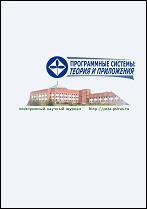|
This article is cited in 2 scientific papers (total in 2 papers)
Mathematical Foundations of Programming
High-precision computations using residue-interval arithmetic on FPGAs
A. S. Korzhavinaa, V. S. Knyaz'kovb
a Vyatka State University
b Penza State University
Abstract:
The problem of round-off errors arises in a large number of issues in
various fields of knowledge, including computational mathematics, mathematical
physics, biochemistry, quantum mechanics, mathematical programming. Today,
experts place particular emphasis on accuracy, fault tolerance, stability, and
reproducibility of computation results of numerical models when solving a wide
range of industrial and scientific problems, such as: mathematical modeling and
structural designs of aircrafts, cars, ships; process modeling and computations for
solving large-scale problems in the field of nuclear physics, aerodynamics, gas, and
hydrodynamics; problems on reliable predictive modeling of climatic processes
and forecasting of global changes in the atmosphere and water environments;
faithful modeling of chemical processes and synthesis of pharmaceuticals, etc.
Floating-point arithmetic is the dominant choice for most scientific applications. However, there are a lot of unsolvable with double-precision arithmetic
problems. A vast number of floating-point arithmetic operations would be
required to solve such problems. Each operation carries round-off errors leading to
uncontrolled round-off errors and, consequently, incorrect results. Many modeling
and simulation problems need to increase the accuracy of number representation
to 100-1000 decimal digits or more to obtain reliable results. In this regard,
arbitrary-precision arithmetic is becoming ever important. With this arithmetic,
one can use numbers, whose arbitrary precision is many times greater than the
word length of the conventional system.
The paper proposes a new way of representing integers and floats for
computations in super-large ranges — hybrid residue-positional interval logarithmic
number representation for performing high-precision and reliable calculations in
super-large numerical ranges.
Key words and phrases:
residue arithmetic, hybrid number systems, the interval logarithmic
number evaluation, high-precision computations, long numbers.
Received: 21.02.2019
18.09.2019
Accepted: 30.09.2019
Citation:
A. S. Korzhavina, V. S. Knyaz'kov, “High-precision computations using residue-interval arithmetic on FPGAs”, Program Systems: Theory and Applications, 10:3 (2019), 81–127
Linking options:
https://www.mathnet.ru/eng/ps347 https://www.mathnet.ru/eng/ps/v10/i3/p81
|

| Statistics & downloads: |
| Abstract page: | 229 | | Full-text PDF : | 80 | | References: | 40 |
|




 Contact us:
Contact us: Terms of Use
Terms of Use
 Registration to the website
Registration to the website Logotypes
Logotypes








 Citation in format
Citation in format 
